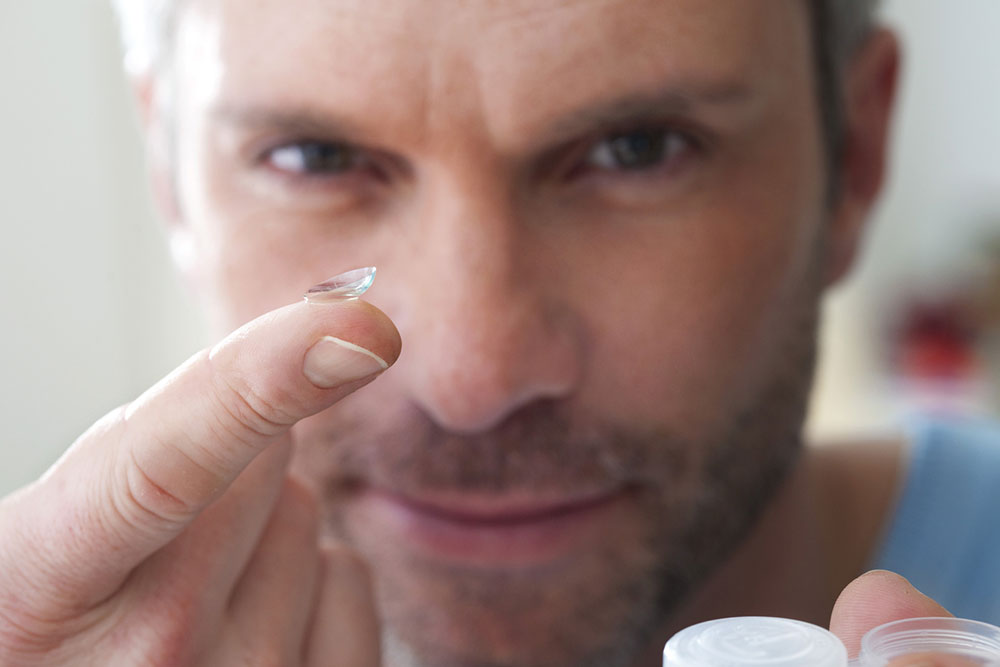4 Ways to Maintain Eye Health While Wearing Contact Lenses

Contact lenses can be a lifeline for those who find wearing glasses regularly too cumbersome. They negate the need to clean the lens constantly and need barely any upkeep. Some might even prefer its aesthetic advantage, like allowing one to change the eye color. However, as contact lenses are closer to the eyes, one must take more precautions to maintain eye health. So, here are four ways to protect one’s vision while wearing eye lenses.
Travel tips while wearing eye lenses
When traveling, it is better to avoid wearing glasses all the time since they could prevent one from participating in activities like adventure sports and get fogged up or dusty. What one needs, thus, are eye lenses. However, if one isn’t careful, one may have to constantly deal with red, watery, and itchy eyes due to one’s contact lenses. Before one leaves on one’s travels, it is advisable to visit the eye care provider and ensure the prescription is up-to-date. During the trip, remember to take out the contact lenses before showering or swimming. Removing them prevents germs in the water from getting into the eyes. Also, replacing the contact lenses as often as one’s eye lens provider advises is essential. One should always use a fresh contact lens solution when storing the eye lenses after each use and remember not to mix new solutions with old or used eye solutions. In the holiday mood, it is easy to forget to remove the lenses before falling asleep. One must avoid going to sleep wearing one’s contact lenses.
Basic but essential restrictions for contact lenses
One must not wear contact lenses if the eyes feel irritated or appear red, and one must consult one’s ophthalmologist in the case of red or sore eyes. Another big no-no is sharing lenses. Even if one uses colored lenses for aesthetic purposes, eye lenses are made to precisely fit one person’s eye size and needs. Sharing contact lenses with another could cause contamination and infections. One can approach one’s eye doctor for information regarding how long and how often one can wear the lenses. Be sure to follow these instructions rigidly. Also, one must not rely solely on contact lenses. Whether colored or not, it is best not to wear lenses full-time; the eyes need a little break. For this reason, one must always have backup glasses. They need not be expensive or fancy, just sufficient to give one’s eyes the healthy interval they need. Also, one must be careful about makeup around the eye as it can cause irritation or even infect the eyes along with one’s lenses.
Keep water and lenses apart
It is quite common for one to forget that they have contact lenses on. Unlike a pair of glasses that might fog up or slide down the nose, lenses, unless they irritate, have no outward sign of existing. This is why many people forget to remove their contact lenses before showering, swimming, or using a hot tub. The first issue with this is that water is not germ-free. Acanthamoeba found in tap water can cause keratitis infections, which are usually painful and hard to treat. Sometimes, it might even take a year of treatment to reverse. Though extremely rare, it is possible that this type of infection could lead to blindness and necessitate a corneal transplant. Another issue is that water can cause soft contact lenses to change shape, swell, or even stick to the eye. In a worst-case scenario, the cornea can get scratched, allowing germs and pathogens to enter the eye and wreak havoc easily. Finally, one must never touch one’s eye lenses after being in the water. One should clean the lenses and then wear them, and remember to wash and dry one’s hands before one puts them on. Finally, if one is a swimmer or loves water sports and is worried one cannot see clearly without lenses, consider prescription goggles or laser surgery to protect the eyes.
Don’t ignore the eye doctor’s advice
One’s eye doctor enables one to maintain good eye health. If one wears lenses, there are some things that one needs to remember when visiting one’s ophthalmologist. Always get a proper prescription from a trusted healthcare professional, and do not get lenses from local stores because it is cheaper or more accessible. One can get colored prescription lenses from certified ophthalmologist brands and stores, but it is strongly recommended not to wear decorative ones from costume stores. One must consult the doctor on how long and often one can wear lenses and try to maintain a chart to track the schedule. There are smartphone apps for this as well. Whenever one’s eyes feel uncomfortable or blurry, or one has a headache, nausea, numbness, double vision, or vision loss, it is imperative to reach out to one’s eye doctor immediately. One should also quickly report unusual redness, light flashes, and eye swelling to the eye doctor and get these treated.










